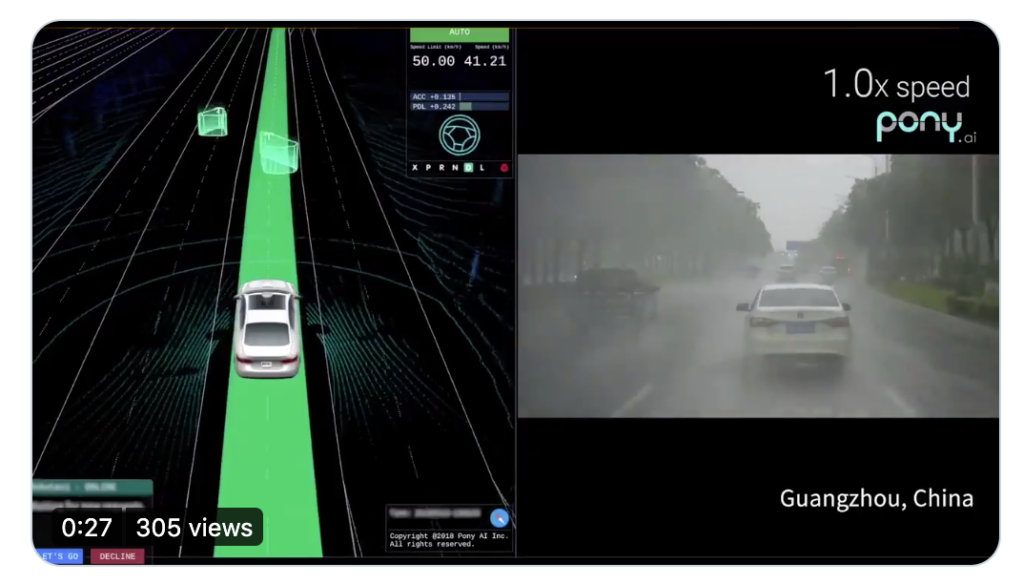
There have been a lot of AI-driven companies that have come out of China over the past decade, putting that nation on par with the AI innovation generated in tech companies in the USA. Now, both the U.S. and Chinese autonomous driving markets are getting a boost from China-based self-driving car company Pony.ai. The company announced recently that it has raised a further $1-billion in funding, taking the valuation to $5.3-billion.
Autonomous vehicles are a highly competitive market in both the U.S. – with the likes of Google, Uber and Tesla developing the technology – and in China where behemoth companies such as Baidu, Waymo and Tencent have entered the marketplace. According to McKinsey, mass deployment of autonomous vehicles in China is expected within nine years, and will generate trillions of dollars in revenue.
Pony.ai says its competitive advantage is that is combines deep learning models with a heuristic approach to boost performance. The website notes that the company enhances performance capability through multi-sensor fusion technology which intelligently leverages the reliable sensor data depending on different environmental or driving scenarios. “We fuse machine learning and deep learning to create a robust Planning and Control module able to smoothly navigate complex road scenarios — from the streets and highways of California to the bustling eight-lane intersections of Chinese metropolises while being prepared for outlier behaviors or events caused by other road agents,” the website reads.
Earlier this year, Pony.ai announced it had received funding and is broadening its partnership with Japan’s Toyota Motor Corporation. That deal will expand the scope of both Toyota and Pony.ai’s autonomous driving pilots in China and further both companies’ work in mobility services. Pony.ai has been testing its Robotaxi pilot service, dubbed ‘PonyPilot,’ in Guangzhou, China since 2018. That service is now offering rides in self-driving vehicles to the general public in some regions of California, including Irvine and Silicon Valley.
This shift toward looking at mobility as a service rather than a product will upend the automotive industry as we know it. “This “mobility-as-a-service” (MaaS) transformation suggests dramatic changes ahead for vehicle sales volumes, business models, and the capabilities companies will need to thrive in this new environment,” McKinsey notes in a report published in 2019. “Autonomous vehicles will likely shift a substantial share of the mobility market value away from products (that is, buying vehicles) and toward services (that is, paying for transportation per mile).”
This is something that is already occurring with the move toward rideshare services rather than driving one’s own car. The Chinese market had 60% higher automotive sales volume than the U.S. in 2018. By 2040, it is forecast that 66% of ‘passenger-kilometers’ will be undertaken in autonomous vehicles in China. Further, McKinsey estimates that AVs will account for more than 40% of new-vehicles sales in that same year, allowing drivers to focus on other tasks during their daily commute and reducing traffic and congestion. “Autonomous vehicles will offer a potential solution to some of these infrastructure challenges. In the realm of shared mobility, they could reduce the number of vehicles on the road and free former drivers to work or relax en-route. If powered by green electricity or hydrogen, they could also help reduce local vehicle emissions,” the McKinsey report reads.
Revolutionizing transportation on a global scale is a part of Pony.ai’s mission. The company was founded in Fremont, California in 2016 by Stanford Ph.D. Dr. James Peng, and former Baidu and Google engineer Dr. Tiancheng Lou. The firm began testing autonomous vehicles on California roads in 2017 and launched the first public-facing Robotaxi service in California in 2019. The company announced this month that it is partnering with a state-owned Chinese company to develop autonomous trucks. Pony.AI was noted as one of Forbes 50 AI Companies to watch in 2020.
Artificial Intelligence is being implemented in industries all over the world and is a central theme of the research undertaken at UCIPT. Our work in the HOPE study is using data to assess and shift behavioral outcomes among HIV and other populations.
